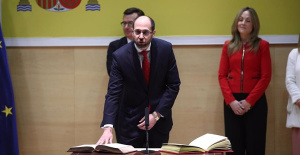MADRID, 7 Oct. (EUROPA PRESS) -
The Minister of the Interior, Fernando Grande-Marlaska, has defended the Special Plan for the Campo de Gibraltar as an example to follow due to the "incontestable" results in a meeting held this Friday before his colleagues from the European Coalition against Organized Crime in Belgium, Germany, France, Italy and the Netherlands.
Specifically, it has highlighted that since the beginning of this special plan, on August 1, 2018, and until last April 30, the police activity deployed in the territories included in the Special Security Plan for the Campo de Gibraltar has allowed the arrest and investigation of more than 10,840 suspects and the seizure of more than 1,400 tons of drugs.
The members of the National Police and the Civil Guard in the Campo de Gribaltar have grown by 31% with the governments of Pedro Sánchez: the region has gone from having 1,956 agents of both bodies in December 2017 to having 2,579 in August 2022, according to insider sources. As regards Algeciras specifically, the city has gone from having 1,201 agents to the current 1,363.
Precisely the mayor of this town, José Ignacio Landaluce, has convened a Local Security Board for the two violent deaths that occurred in the municipality this week --his relationship with drug trafficking is being investigated--, in addition to asking for more and better organized agents, especially "if any structure is changed, such as the Civil Guard's Anti-Drug Trafficking Coordination Body (OCON)".
The minister, for his part, defended at the meeting held in Amsterdam that the results of the Campo de Gibraltar Special Plan are "incontestable". "The number of investigations and arrests has increased and the pressure on the organizations established there has caused an appreciable change in the way they operate," he pointed out, as reported by the Interior in a statement.
Grande-Marlaska has valued the "creation of synergies" between the different police forces, customs and the judiciary, "so that the action of criminal gangs is increasingly difficult."
He has also advocated developing new technological tools that allow access to the information handled by criminal groups through the Internet to ensure that crime "is not profitable."
Grande-Marlaska has opted to strengthen international cooperation, especially with Latin America and the Caribbean, an action that, according to what has been advanced, will be one of the Spanish priorities during the next Spanish Presidency of the EU in 2023.
Grande-Marlaska has opted to strengthen the European coalition at the meeting held in Amsterdam, which was also attended by the European Commissioner for Home Affairs, Ylva Johansson, the Executive Director of Europol, Catherine De Bolle, and the President of Eurojust, Ladislav Hamran .
The countries of the European Coalition against Organized Crime have given the green light to the new multi-year action plan, which updates the priorities of the four blocks of action adopted in 2021: logistics hubs and maritime security; economic and financial dimension of organized crime; technological innovation and, finally, international cooperation. To these four blocks another generic one of operational needs has been added.

 Exploring Cardano: Inner Workings and Advantages of this Cryptocurrency
Exploring Cardano: Inner Workings and Advantages of this Cryptocurrency Seville.- Economy.- Innova.- STSA inaugurates its new painting and sealing hangar in San Pablo, for 18 million
Seville.- Economy.- Innova.- STSA inaugurates its new painting and sealing hangar in San Pablo, for 18 million Innova.- More than 300 volunteers join the Andalucía Compromiso Digital network in one month to facilitate access to ICT
Innova.- More than 300 volunteers join the Andalucía Compromiso Digital network in one month to facilitate access to ICT Innova.-AMP.- Ayesa acquires 51% of Sadiel, which will create new technological engineering products and expand markets
Innova.-AMP.- Ayesa acquires 51% of Sadiel, which will create new technological engineering products and expand markets AstraZeneca admits that its Covid vaccine can cause side effects such as thrombosis in "very rare cases"
AstraZeneca admits that its Covid vaccine can cause side effects such as thrombosis in "very rare cases" The PP signs the director of the cabinet of the governor of the Bank of Spain for its list for the European elections
The PP signs the director of the cabinet of the governor of the Bank of Spain for its list for the European elections Illa does not rule out agreeing with Junts after the Catalans if they do not prioritize independence
Illa does not rule out agreeing with Junts after the Catalans if they do not prioritize independence Los Angeles Police begin to dismantle the encampment at the University of California
Los Angeles Police begin to dismantle the encampment at the University of California How Blockchain in being used to shape the future
How Blockchain in being used to shape the future Not just BTC and ETH: Here Are Some More Interesting Coins Worth Focusing on
Not just BTC and ETH: Here Are Some More Interesting Coins Worth Focusing on UPV students design an app that helps improve the ventilation of homes in the face of high temperatures
UPV students design an app that helps improve the ventilation of homes in the face of high temperatures Ivace and promotes a less invasive device for the early detection of prostate cancer
Ivace and promotes a less invasive device for the early detection of prostate cancer Valencia unanimously approves the ordinance to allocate spaces to test innovative initiatives
Valencia unanimously approves the ordinance to allocate spaces to test innovative initiatives UPV researchers promote a paid master's degree as a "talent factory" in integrated photonics
UPV researchers promote a paid master's degree as a "talent factory" in integrated photonics A million people demonstrate in France against Macron's pension reform
A million people demonstrate in France against Macron's pension reform Russia launches several missiles against "critical infrastructure" in the city of Zaporizhia
Russia launches several missiles against "critical infrastructure" in the city of Zaporizhia A "procession" remembers the dead of the Calabria shipwreck as bodies continue to wash up on the shore
A "procession" remembers the dead of the Calabria shipwreck as bodies continue to wash up on the shore Prison sentences handed down for three prominent Hong Kong pro-democracy activists
Prison sentences handed down for three prominent Hong Kong pro-democracy activists ETH continues to leave trading platforms, Ethereum balance on exchanges lowest in 3 years
ETH continues to leave trading platforms, Ethereum balance on exchanges lowest in 3 years Investors invest $450 million in Consensys, Ethereum incubator now valued at $7 billion
Investors invest $450 million in Consensys, Ethereum incubator now valued at $7 billion Alchemy Integrates Ethereum L2 Product Starknet to Enhance Web3 Scalability at a Price 100x Lower Than L1 Fees
Alchemy Integrates Ethereum L2 Product Starknet to Enhance Web3 Scalability at a Price 100x Lower Than L1 Fees Mining Report: Bitcoin's Electricity Consumption Declines by 25% in Q1 2022
Mining Report: Bitcoin's Electricity Consumption Declines by 25% in Q1 2022 Oil-to-Bitcoin Mining Firm Crusoe Energy Systems Raised $505 Million
Oil-to-Bitcoin Mining Firm Crusoe Energy Systems Raised $505 Million Microbt reveals the latest Bitcoin mining rigs -- Machines produce up to 126 TH/s with custom 5nm chip design
Microbt reveals the latest Bitcoin mining rigs -- Machines produce up to 126 TH/s with custom 5nm chip design Bitcoin's Mining Difficulty Hits a Lifetime High, With More Than 90% of BTC Supply Issued
Bitcoin's Mining Difficulty Hits a Lifetime High, With More Than 90% of BTC Supply Issued The Biggest Movers are Near, EOS, and RUNE during Friday's Selloff
The Biggest Movers are Near, EOS, and RUNE during Friday's Selloff Global Markets Spooked by a Hawkish Fed and Covid, Stocks and Crypto Gain After Musk Buys Twitter
Global Markets Spooked by a Hawkish Fed and Covid, Stocks and Crypto Gain After Musk Buys Twitter Bitso to offset carbon emissions from the Trading Platform's ERC20, ETH, and BTC Transactions
Bitso to offset carbon emissions from the Trading Platform's ERC20, ETH, and BTC Transactions Draftkings Announces 2022 College Hoops NFT Selection for March Madness
Draftkings Announces 2022 College Hoops NFT Selection for March Madness



























